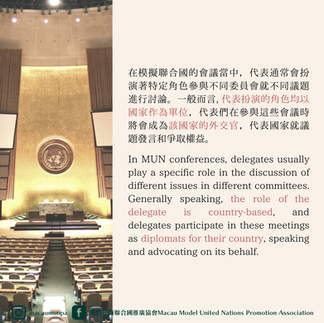Fun Facts @MUN
- MMUNPA

- Feb 24, 2022
- 1 min read
In MUN conferences, delegates usually play a specific role in the discussion of different issues in different committees. Generally speaking, the role of the delegate is country-based, and delegates participate in these meetings as diplomats for their country, speaking and advocating on its behalf.
In the MUN Conferences, delegates must state their position in the third person.
For example, the delegate of France may not use the words "I think" in the Human Rights Council, but rather "The delegate of France thinks..." or "The French side thinks..." in any form other than the first person.
So how does a delegate of a country facilitate the discussion of a topic? Then it is up to the state to take the initiative in the meeting. No matter which committee is discussing a topic, it is the initiative of the state that drives the proceedings.
National initiatives are initiatives and actions proposed by the delegates at the MUN Conference, who then have the opportunity to present their own positions and make recommendations on the issues discussed. Eventually, delegates reach a consensus through different types of initiatives and state the solution and conclusion on the issue within the scope of function.
As you can see, when you formally become a delegate of a country in the MUN, you are no longer the same individual, because you have the right and responsibility to speak out for your represented country, to fight for its interests and to contribute to the development of the international community, and this starts with advocacy.
















Comments